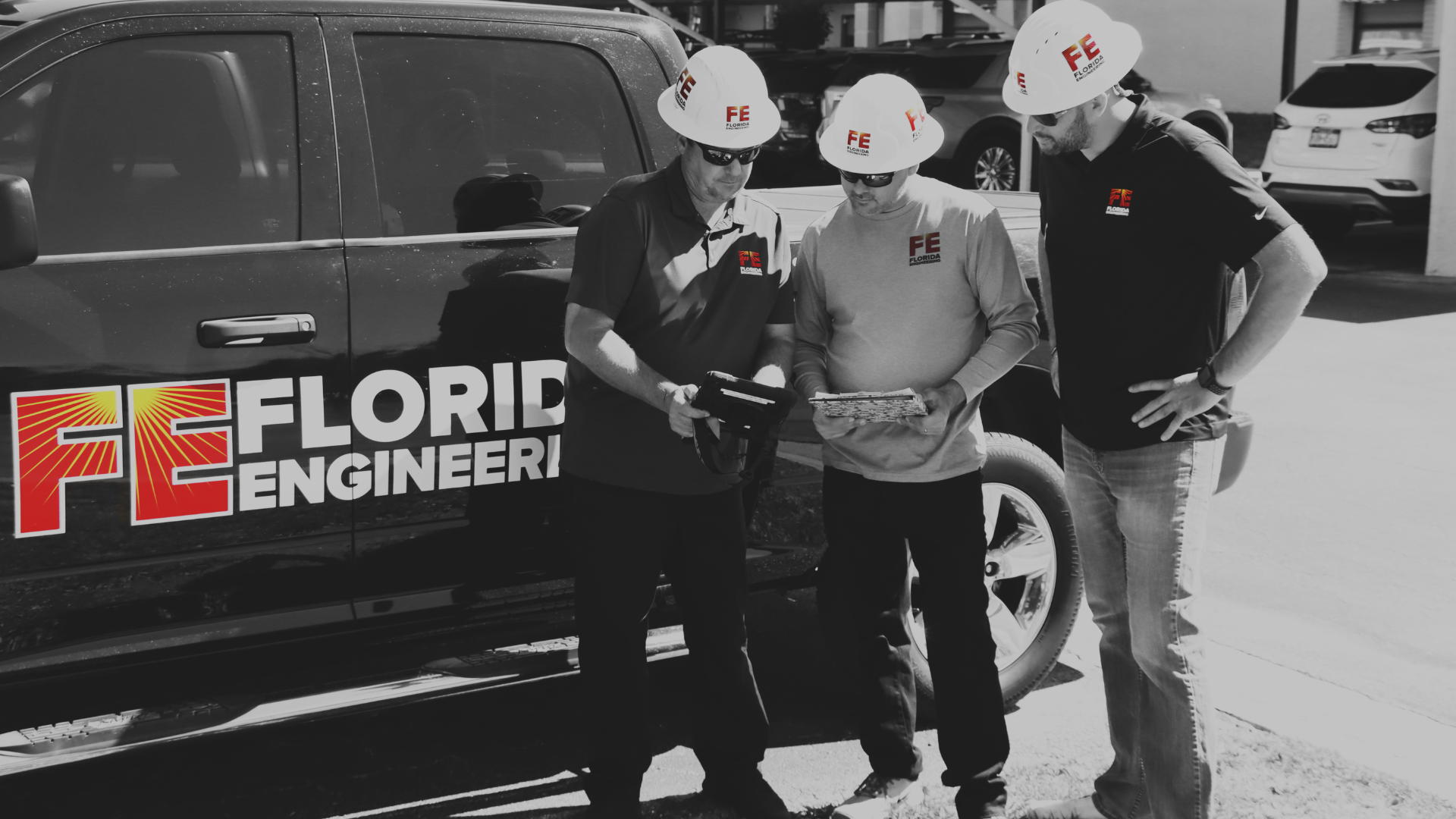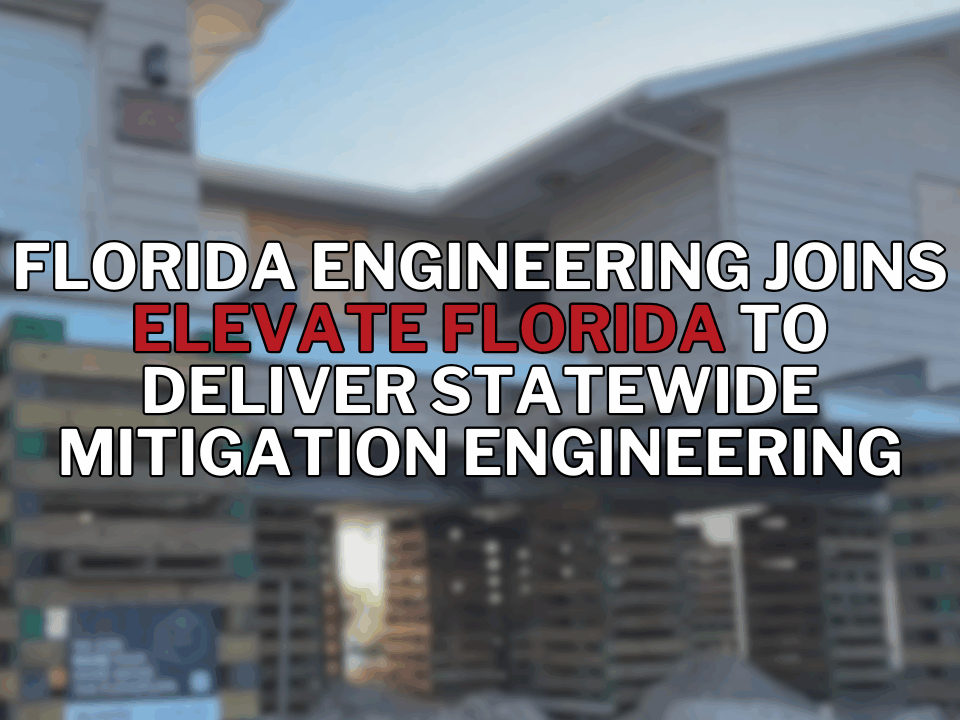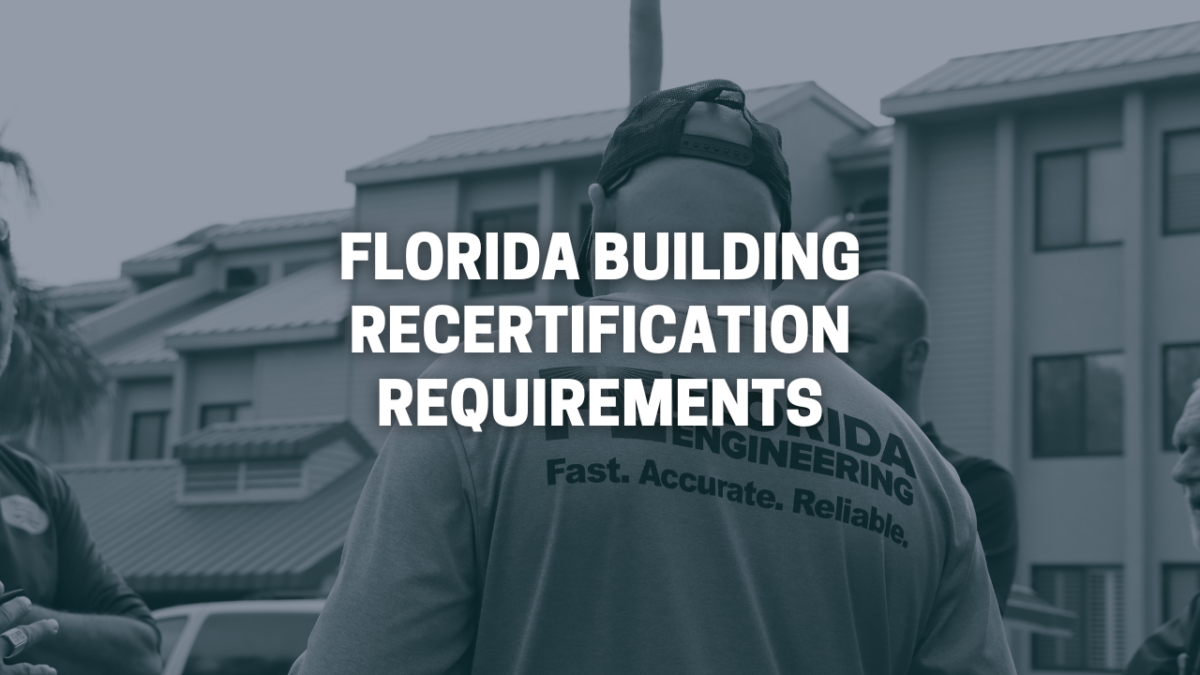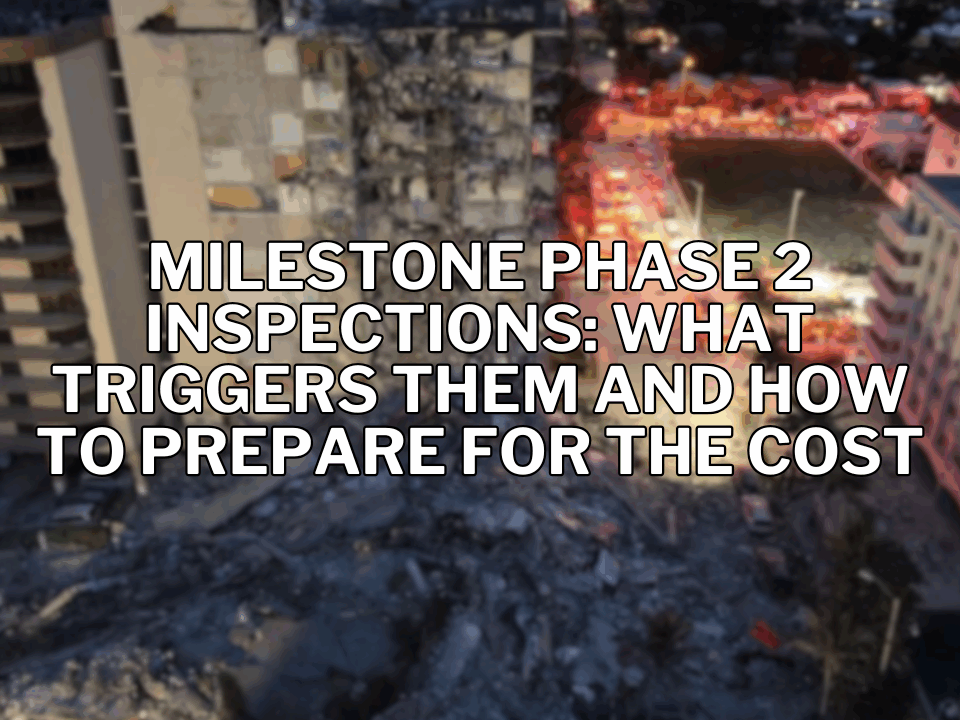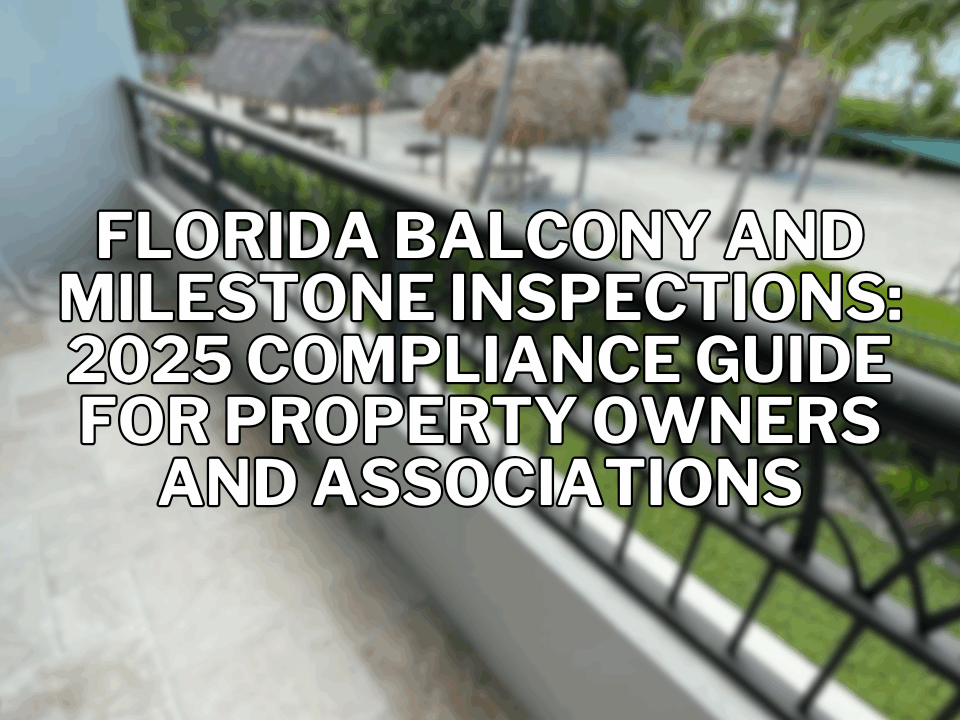The looming deadline for Florida building recertification can be a source of stress and uncertainty for property owners and managers.
With critical inspections required at the 25-year mark and every 10 years thereafter, understanding the intricate requirements for structural and electrical systems is vital. After all, these inspections ensure your building’s safety and adherence to stringent codes.
That’s why we created this guide on the Florida building recertification requirements to demystify the process, providing actionable tips to maintain your property’s compliance. We’ll cover everything you need to know about getting your building up to local standards.
You can connect with us today for immediate peace of mind on any Florida milestone inspection. Florida Engineering offers expert guidance to navigate recertification effortlessly, helping you get your building compliant fast so you can put this stress in the past!
What are the Florida Building Recertification Requirements?
Let’s not waste any time digging into the Florida building recertification requirements. There is a lot that goes into keeping the state’s coastal buildings up to code, including structural assessment, electrical inspections, and much, much more.
This is why having the help of an expert like Florida Engineering is invaluable. You don’t need to worry about all the nuances of the recertification process with our guidance just a click away!
Initial Inspection Timeline
First things first – how often are buildings inspected in Florida? The recertification process begins when a building reaches 25 years of age in Miami-Dade and Broward counties, with subsequent inspections every 10 years following the initial recertification.
This timeline is critical for property owners to understand, as preparing for and passing these inspections is essential for the safety of the building’s occupants and for maintaining compliance with county regulations.
The good news? We can handle each and every milestone inspection on your behalf, including:
- 25 year recertification
- 30 year recertification
- 40 year recertification
- 50 year recertification
- 60 year recertification
What is actually being inspected?
Recertification inspections cover two primary areas: structural and electrical. These inspections are comprehensive and are aimed at identifying any potential issues that could compromise the safety or functionality of the building. We’ll unpack the details of each aspect below.

Structural Inspection
The structural inspection is a cornerstone of the recertification process, especially given our state’s susceptibility to hurricanes and other severe weather events. This is often referred to as the structural integrity reserve study in Florida.
The inspection must assess the integrity of the building’s foundation, load-bearing walls, beams, columns, floors, and roofs. Inspectors look for signs of distress, such as cracks, rust, corrosion, or deflection, that could indicate structural weakness.
They also evaluate the building’s ability to withstand wind and seismic forces based on the Florida Building Code, which includes specific design and construction standards to enhance resilience against natural disasters.
Electrical Inspection


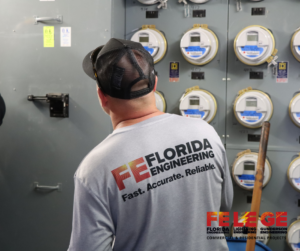
The electrical inspection focuses on ensuring the building’s electrical systems meet current safety standards.
Inspectors examine the condition of wiring, the adequacy of surge protection, and the functionality of circuit breakers and fuses. They check for compliance with the National Electrical Code (NEC), which is integrated into the Florida Building Code.
This includes ensuring that all electrical components are properly grounded and that there are no overloaded circuits, which pose a significant fire risk. Inspectors also verify that the building has sufficient emergency lighting and that all electrical systems are accessible for maintenance and emergency services.
If any deficiencies are found, property owners will be required to make the necessary repairs or upgrades to achieve compliance. You can learn more about the new Florida condo laws in 2024 in our blog. But, let’s look at some of the Florida building recertification requirements from a safety feature standpoint.
Safety Features

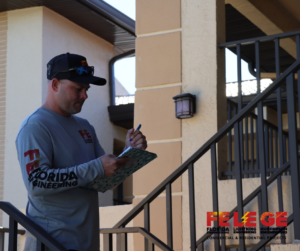

Safety feature inspections focus on systems designed to protect occupants in the event of an emergency. This includes fire alarms, sprinkler systems, smoke detectors, and emergency lighting, all of which must be in working order and compliant with the Florida Fire Prevention Code.
Inspectors also check that exits are clearly marked, unobstructed, and can accommodate the swift evacuation of all occupants. Additionally, they ensure that stairways, railings, and balconies meet structural safety standards to prevent falls and injuries.
Required Documentation
Inspectors will expect to see a comprehensive set of records, including previous inspection reports, maintenance logs, and any repairs or upgrades made to the building.
This paper trail is proof that you’ve been diligent in upkeeping your property, and it can smooth the path to a successful recertification.
Code Compliance
The Florida Building Code is the benchmark for all things construction and maintenance. It’s a living document, constantly evolving to incorporate the latest safety standards and best practices.
Every nook and cranny of your building will be evaluated against these standards during recertification. From the grandeur of the main entrance to the unseen workings of the HVAC system, everything must be up to code to pass muster.
Local Amendments
Florida is a tapestry of diverse communities, each with its unique set of challenges and regulations. Local amendments to the state building code take these differences into account, tailoring requirements to the specific needs of the area.
It’s vital to stay informed about these local variations, as they can significantly impact the recertification process. Whether it’s additional wind-resistance standards in hurricane-prone areas or specific historical preservation guidelines, these local nuances are critical to achieving compliance.
How to Ensure Your Florida Building Meets the Recertification Requirements
Being aware of the Florida building recertification requirements is just half the battle. It’s up to you as a property owner or manager to take the necessary steps to get your building up to the standards laid out in your local building code.
As we said from the start, this is something you can rely on the guidance of Florida Engineering for. In the meantime, here are some of our tips on ensuring your building meets the recertification requirements for Florida buildings.
Pre-Inspection Self-Assessment
Start with a thorough self-assessment of your building. This proactive measure can help identify potential issues before the official inspection.
Use a checklist based on the Florida Building Code to examine structural and electrical systems, safety features, and general maintenance.
Look for obvious signs of wear and tear, outdated systems, or safety equipment that may not function properly. Addressing these issues early can save time and money down the line.
Professional Inspections and Consultations
Hiring a professional inspector or engineer who specializes in Florida building codes is an investment in the longevity and safety of your building. In this sense, the milestone inspection Florida cost is an investment in peace of mind.
These experts can provide a detailed assessment that might reveal less obvious deficiencies. They can also offer valuable advice on how to address complex issues and ensure compliance with local amendments. We’ll show you shortly why Florida Engineering is the most trusted choice in the Sunshine state.
Addressing Deficiencies and Making Necessary Repairs
Once you have a list of deficiencies, prioritize them and begin repairs. Some issues may be simple fixes, while others could require more extensive work.
It’s important to hire qualified contractors who are familiar with the Florida Building Code to ensure repairs are done correctly. Keep in mind that some repairs may require permits, so factor in the time and cost of obtaining these when planning your repair schedule.
Record-Keeping and Documentation for Recertification
As we said earlier, you may need to show documentation during the recertification process. That’s why good record-keeping is essential as you prepare for recertification at any milestone.
Maintain detailed records of all inspections, repairs, and maintenance activities. Include dates, descriptions of the work, and any permits or approvals.
Staying Ahead of the Curve with Proactive Maintenance and Upgrades
We encourage all Florida building owners and property managers to adopt a proactive approach to building maintenance and upgrades.
Regularly review and update your maintenance plans to align with the latest building codes and technologies. Investing in upgrades that enhance safety and efficiency can not only help with recertification but also reduce long-term operating costs and increase the value of your property.
Stop Stressing Over Florida Building Recertification Requirements, Enjoy Peace of Mind with Florida Engineering!
Navigating the complexities of Florida’s building recertification requirements can be daunting, but with Florida Engineering on your side, you can turn stress into confidence and peace of mind. Our team of seasoned professionals is here to guide you through the entire process, ensuring your building not only meets but exceeds the necessary standards.
From structural to traditional reserve study in Florida, we’re the #1 choice thanks to our track record of consistently overdelivering for our clients. The proof is in the numbers – a whopping $45 million in savings across more than 150,000 projects!
From pre-inspection assessments to addressing any deficiencies, our engineers and inspectors are well-versed in the Florida Building Code and local amendments, providing tailored solutions for your property. Our team boasts a cumulative 100+ years of experience in serving the Sunshine state.
We also understand the importance of time and efficiency. Our specialists conduct thorough inspections with a keen eye for detail, identifying any potential issues swiftly and providing clear, actionable advice. You can expect a streamlined process that minimizes downtime and disruption.
Choosing Florida Engineering means gaining a partner who is as invested in your building’s compliance and safety as you are. We’re committed to providing exceptional service and peace of mind, so you can focus on what you do best while we handle the complexities of building recertification.
So, get in touch today and ensure your property meets the Florida building recertification requirements!
Final Thoughts on the Florida Building Recertification Requirements
Navigating Florida’s recertification requirements for coastal buildings specifically is all about preparation, attention to detail, and proactive maintenance.
By conducting thorough self-assessments, engaging with professional inspectors, addressing repairs promptly, and keeping meticulous records, you can ensure compliance and enhance the safety of your building.
Remember, staying ahead of maintenance not only aids in recertification but also preserves the value and integrity of your property. But the best way to invest in the longevity of your property is through the expert guidance awaiting you at Florida Engineering.
Ready to ensure your building meets all recertification requirements without the hassle? Reach out today for peace of mind tomorrow!
Looking for

